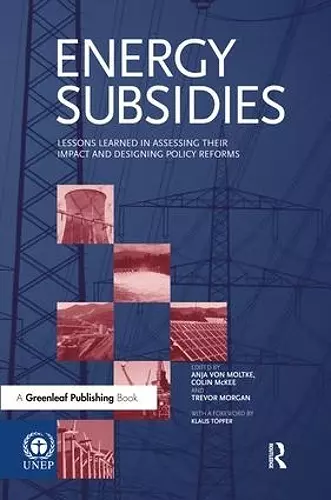Energy Subsidies
Lessons Learned in Assessing their Impact and Designing Policy Reforms
Klaus Töpfer editor Anja von Moltke editor Trevor Morgan editor Colin McKee editor
Format:Hardback
Publisher:Taylor & Francis Ltd
Published:1st Feb '04
Currently unavailable, and unfortunately no date known when it will be back

Based on ground-breaking work undertaken by UNEP and the International Energy Agency, this book raises awareness of the actual and potential impacts of energy subsidies and provides guidance to policy-makers on how to design and implement energy-subsidy reforms.
Raising awareness of the actual and potential impacts of energy subsidies and giving guidance to policy-makers on how to design and implement reforms, this title provides methodologies for analysing the impact of subsidies and reviews experiences in a number of countries and regions.The need to reform energy subsidies was one of the pressing issues highlighted at the World Summit on Sustainable Development. Many types of subsidy, especially those that encourage the production and use of fossil fuel, and other non-renewable forms of energy, are harmful to the environment. They can also have high financial and economic costs, and often only bring few benefits to the people for whom they are intended.Removing, reducing or restructuring such energy subsidies is helpful for the environment and the economy at the same time. Potential social costs in terms of employment in the conventional energy industry or reduced access to energy could be addressed by redirecting the money formerly spent on subsidies to income support, health, environment, education or regional development programmes.Of course, subsidies can have certain positive consequences, particularly where they are aimed at encouraging more sustainable energy production and use. Temporary support for renewable energy and energy-efficient technologies to overcome market barriers, and measures to improve poor or rural households' access to modern, commercial forms of energy, for instance, could be positive measures in support of sustainable development.Based on ground-breaking work undertaken by UNEP and the International Energy Agency, this book aims to raise awareness of the actual and potential impacts of energy subsidies and provide guidance to policy-makers on how to design and implement energy-subsidy reforms. It provides methodologies for analysing the impact of subsidies and their reform, and reviews experiences with energy subsidies in a number of countries and regions. Drawing on these case studies, it analyses the lessons learned as well as the policy implications, and provides guidance on how to overcome resistance to reform.The book provides an analytical framework which aims to set the scene for the detailed discussion of energy-subsidy issues at the country level. It considers how subsidies are defined, how they can be measured, how big they are and how their effects can be assessed. A more detailed discussion of methodological approaches to the assessment of the economic, environmental and social...
ISBN: 9781874719113
Dimensions: unknown
Weight: 720g
183 pages